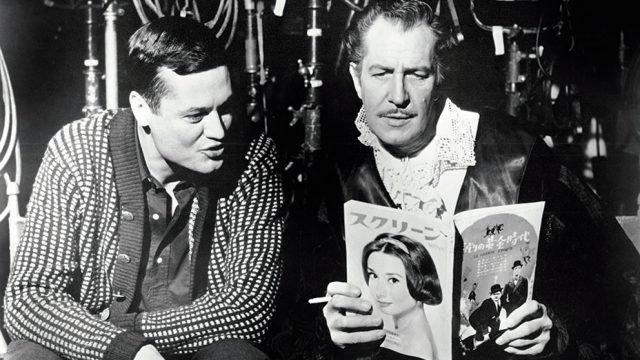When I talked about Mel Brooks, I brought up the fact that I don’t actually like his movies all that much bust still consider him worthy of discussion because of the work he’s done for others’ careers. And that’s fine. But the interesting thing about Roger Corman is the argument that basically no one much likes his own movies—because they’re generally pretty terrible, you see—and that even his honorary award was for “his rich engendering of film and filmmakers.” In other words, other people’s careers.
To me, at least, that’s okay. I’ve seen a few of Corman’s own films—about a half-dozen of the movies he himself directed. Saying they aren’t very good feels charitable. They mostly look like movies that were made in two days on a budget of about $1.98. Which, okay, they pretty much were. No one denies that, least of all Corman himself. Nor that they were made in two days for about $1.98 for the express purpose of making quite a lot more as the B-picture at a drive-in, where no one really cared. Corman’s movies are what they are, and no one denies that.
I’m not even sure his films are so much higher in quality than those of men like Bert I. Gordon, who don’t seem to have the same cultural weight. I’m not sure they’re worse, either, but there’s a whole long stratum of quality that gets pretty indistinguishable—bad enough to be bad, but not bad enough to be famously bad. Corman, for all his failings, is a better filmmaker than Ed Wood, for example.
The difference is the people he hired. For whatever reason, while Ed Wood attracted people like Tor Johnson, Roger Corman attracted people like Jack Nicholson. When he was working as a producer, he hired such young talents as both Coppola and Scorsese. Ron Howard when everyone thought of his as Opie or Richie Cunningham. James Cameron. Jonathan Demme. Curtis Hanson, who would go on to make L. A. Confidential. Basically, the Academy gave him an honorary Oscar for creating other Oscar winners.
Hell, even though Stephen King is, shall we say, unlikely to win an Oscar, and even though he never worked directly with Corman—though Corman’s New World Pictures produced Children of the Corn—he was himself definitely influenced by Corman’s work, as any of King’s own descriptions of his adolescent movie-going will tell you. Most of those Corman movies I’ve seen, I’ve seen with puppets in the corner—though I grant you, that’s how I know about Bert I. Gordon, too. It’s hard to talk about the history of lowbrow entertainment in the mid-twentieth century at all without Corman coming into it somewhere.
Oh, yes, and New World Pictures. You may recognize a few of its releases. Cries and Whispers. Amarcord. Dersu Uzala. Mon oncle d’Amérique. The Tin Drum. Fitzcarraldo. Okay, and such classics as The Cars That Ate Paris and The Slumber Party Massacre, but who’s counting ? The fact is, for ten years, no one won more Best Foreign Language Film Oscars as a distributor than New World Pictures. And that was because Roger Corman thought those films deserved an American release and got them one.
Roger Corman. Not a great director. A great force in film.

